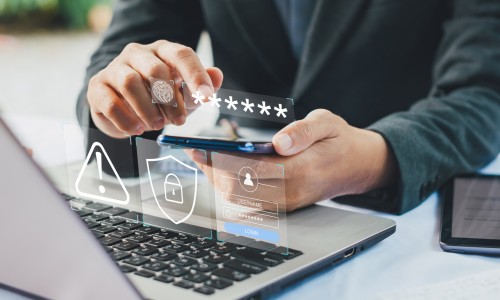
ChatGPT and the Impact on CyberSecurity
22 September 2023
With the rapid advancement of technology, artificial intelligence (AI) has become increasingly prevalent across various domains, revolutionising industries and improving efficiency. According to industry reports, the global AI market is projected to reach a staggering $190 billion by 2025, underscoring the increasing reliance on AI solutions for various applications. One noteworthy development in the field of AI is ChatGPT, a powerful language model created by OpenAI.
With its ability to engage in conversational interactions, ChatGPT has opened up new horizons for communication and problem-solving. However, alongside its immense potential, there are also potential risks associated with the misuse of ChatGPT. Hackers can exploit this technology to breach advanced cybersecurity systems, posing significant threats to individuals, businesses, and organisations.
In this article, we’ll aim to shed light on the impact of AI on cybersecurity, with a specific focus on ChatGPT.
Understanding ChatGPT
ChatGPT is an advanced language model designed to engage in conversational interactions. It leverages sophisticated deep learning techniques, particularly a variant of the Transformer model, to generate human-like responses based on the input it receives. This allows ChatGPT to go beyond traditional chatbots, offering contextually relevant and coherent replies.
The underlying technology behind ChatGPT involves training the model on an extensive dataset comprising books, articles, and internet text. This broad exposure enables ChatGPT to develop a deep understanding of language patterns and structures, empowering it to generate responses that are remarkably fluent and natural-sounding. With its ability to engage in dynamic conversations, ChatGPT serves as a powerful tool for various applications, ranging from customer support to content generation and personal assistance.
How Do Hackers Exploit ChatGPT to Commit Crime?
While ChatGPT offers significant advantages, its potential for misuse and manipulation raises concerns in the realm of cybersecurity.
Here are some of the ways hackers use ChatGPT:
1. AI-Generated Phishing Scams
Phishing scams are deceptive tactics used by cybercriminals to trick individuals into revealing sensitive information or performing malicious actions. With the advent of AI, including ChatGPT, the landscape of phishing attacks has become more sophisticated. AI-powered algorithms can be employed to generate convincing phishing emails that closely mimic legitimate communications, making it challenging for recipients to identify them as fraudulent. Traditional email security systems often struggle to detect AI-generated phishing attempts due to the ability of AI models to emulate human writing styles and bypass keyword-based filters.
Given the evolving nature of these threats, user education and awareness play a crucial role in identifying and mitigating AI-generated phishing attempts. It is essential to promote cybersecurity best practices, such as scrutinising email senders, verifying requests independently, and being cautious of suspicious links or attachments, to safeguard against the risks posed by AI-generated phishing scams.
2. Impersonation
ChatGPT’s ability to generate human-like responses opens up the potential for hackers to exploit it for impersonation purposes. By impersonating individuals or entities through text-based interactions, attackers can deceive users and gain unauthorised access to sensitive information. AI-powered impersonation attacks pose significant risks across various sectors, including social engineering and targeted scams. Hackers can manipulate ChatGPT to craft convincing messages that appear legitimate, leading individuals to disclose confidential data or perform actions that compromise their security.
To protect against such attacks, it is crucial to employ strategies such as verifying the authenticity of communication channels, confirming the identity of individuals or organisations through alternate means, and maintaining a healthy scepticism towards unsolicited requests or unusual behaviour.
3. Duping ChatGPT into Writing Malicious Code
By exploiting the language generation capabilities of ChatGPT, attackers can potentially induce it to produce harmful instructions or code. The consequences of successfully manipulating ChatGPT in this manner are severe, as it could lead to the creation of malware, backdoors, or other harmful exploits that compromise the security of systems and networks.
To address this growing threat, ongoing research and efforts are being undertaken to develop defences against adversarial attacks on AI systems. These efforts involve the exploration of techniques such as adversarial training, robust model architectures, and anomaly detection methods to detect and mitigate the risks posed by adversarial attacks.
Additionally, developers and organisations must prioritise security in the design and implementation of AI systems. Regular vulnerability assessments, secure coding practices, and the incorporation of multi-layered security mechanisms are crucial to enhance the overall resilience of AI systems against adversarial attacks.
Regulating AI Usage and Capabilities
The increasing integration of AI systems, including ChatGPT, in various domains highlights the need for regulations and guidelines to govern their usage and capabilities. Ethical and legal considerations surrounding AI and cybersecurity are of utmost importance to ensure responsible deployment and mitigate potential risks. Currently, the state of AI regulation varies across different jurisdictions, with some governments and organisations taking proactive steps to address AI-related risks. Initiatives range from developing ethical frameworks and guidelines for AI development and deployment to establishing regulatory bodies for oversight and accountability.
To effectively regulate AI, a balanced approach is necessary, striking a harmonious blend between mitigating cyber threats and fostering innovation. This can be achieved through a combination of transparent and accountable AI practices, proactive risk assessments, international collaboration, and adaptive regulatory frameworks that keep pace with the rapidly evolving AI landscape. By doing so, we can harness the transformative potential of AI while safeguarding cybersecurity and protecting individual rights and societal well-being.
Protect Yourself From AI-Powered Cyber Attacks
In the face of AI-powered cyber threats, it is essential to take proactive measures to mitigate risks and protect against potential vulnerabilities. Responsible use of AI in cybersecurity, including ChatGPT, is crucial to maintain the integrity and security of digital systems.
By staying informed about the evolving landscape of AI in cybersecurity, adopting best practices, and prioritising security measures, individuals and organisations can navigate the challenges posed by AI-powered threats effectively.
Questions about your business’s cyber security?
As security threats become more and more advanced, it’s important to have a layered approach to your business’s cyber security. A simple firewall that comes bundled with anti-virus software won’t cut it anymore.
Here at ICT Solutions, we offer cyber security services to help businesses across the UK defend themselves from the evolving threats that cyber attacks can pose.
From ransomware detection to firewalls, password management to real-time monitoring; our cyber security service covers all eventualities. Get in touch with our team today to learn more about how we can help protect your business.



